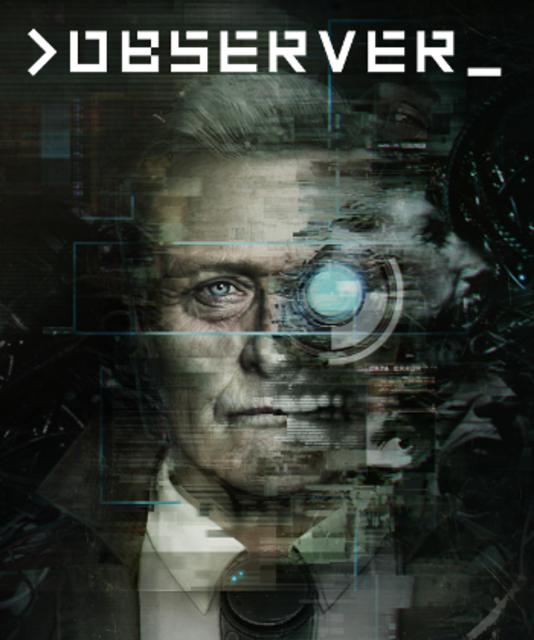Observer is a gorgeous love letter to cyberpunk aesthetics but fails to fully capitalize on its world and ideas.
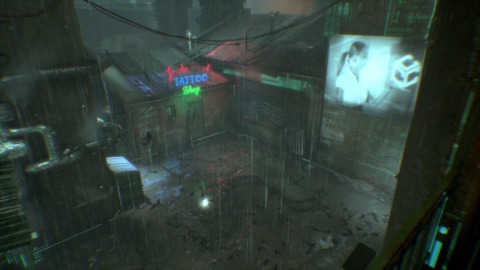
In Observer, you play as Daniel Lazarski, a detective working with the Krakow Police Department in Poland. He is an Observer, a unique type of detective with the authority and ability to hack into the neural chips of suspects and victims in order to solve crimes. As the game opens, Daniel receives a mysterious call from his estranged son, Adam, who he hasn’t seen in years. He quickly triangulates the call and goes to investigate the tenements that the call appears to have come from. Things quickly get even stranger for the detective as the building goes into lockdown protocol and people start dying. You have to explore the complex and solve the murders while also trying to find your long-lost son and keep him safe.
The gameplay is reminiscent both of the developer’s previous game, Layers of Fear, and other horror-y exploration games like Soma. As you try to figure out what’s going on, you explore the various floors of the apartments, being given access to new areas as the game progresses. Most of the rooms are locked, but you can talk to some of the residents through their intercoms for information or flavor. There are also some simplistic puzzles to solve from time to time, often requiring use of one of your vision modes--scanning for biological or electronic evidence--to find the necessary pieces. You can also peruse computer terminals for emails, documents, and other information. It’s all very straightforward and plays just as you would expect from a game of this type.
The way that Observer stands out from those other games is in the strength of its cyberpunk setting and aesthetic. Very little is told to you overtly, as the game instead prefers you infer things about the world through environment design, conversations you have with the tenants of the apartment complex, and little snippets of news and email you get on the computer terminals. The side quests do a great job of this in particular, setting up thought-provoking scenarios that might have arisen in a future such as this and asking the player to explore what exactly they might mean in the long-term. Sadly, there’s just wasn’t enough of either the side quests or the world-building to satisfy me. I had so many questions about the history of events leading up to this game that were never answered to my satisfaction, instead remaining vague and focusing on the mostly-boilerplate main plot. It was disappointing but it also speaks to the strength of the setting that I wanted more so badly.
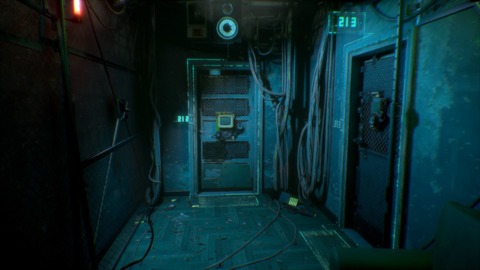
The aesthetic is maybe even more impressive than the world-building. It perfectly nails the mix of grungy environments, constant rain, bright neon signs, and holographic displays that define the genre’s look. The attention to detail makes it a wholly believable world, from the flashy advertisements for VR headsets and new implants to the plethora of dangling cords and slapped-on electronic components jammed into a building that clearly wasn’t built with them in mind. It’s a gorgeous representation of cyberpunk that manages to stand out despite relying so heavily on predictable visuals of the genre. There’s really only one problem: a heavy blur and film grain applied to the game. While I understand the intent behind this look, as it adds to the overall grunginess of the setting, it makes everything hazy in a way that really detracted from the style for me. Aside from this lack of clarity, I think this game nails its look in every way imaginable.
The best parts of the game are the setpiece moments that often come as you utilize your Observer abilities and jack into the neural chips of another person. As you might expect, these sections can get trippy, often jumping non-linearly between different moments of that person’s life. They have the most memorable imagery present in the game by far and also often feature clever game-design tricks and subversions that I found happily reminiscent of Layers of Fear. Some of the effects used during these sections are very intense as well, jerking the screen or altering your perspective in such a way that I was often entirely unable to comprehend what I was seeing, sometimes even to the point of nausea. It’s almost too much at times, but it definitely led to a memorable experience, uneasy stomach and all.
I also think that the world is smartly filled with intriguing characters, even if many of them are one-note and predictable. Most of these characters are the various tenants behind the doors of the apartments you cannot go in, simply a voice on the other end of an intercom. Despite this limitation, I found many of them memorable. Some great examples are a pun-favoring pleasure robot that seems to know more than she lets on, a family of unmodded people trying to convince your character to come to their church, and a VR enthusiast who is too attached to his new reality. Nearly all of these are complete with solid voice performances that eagerly sell their characters. Sadly, your main character’s voice, performed by Rutger Hauer, is absolutely terrible. While I think that Hauer’s voice is iconic and sounds cool as hell, his performance feels entirely uninvested. His flat delivery sucks any emotion out of his performance, and I could barely understand many of his lines due to his style of speaking. It’s the one real dud of a performance in the game; sadly, it’s also the voice you hear the most often.
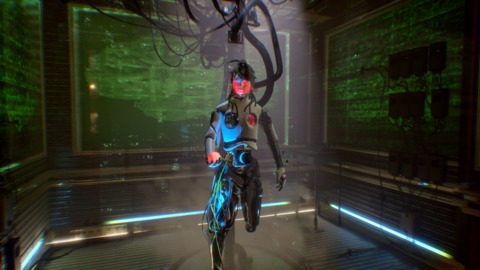
While I loved the world and look of Observer, it has a myriad of other problems that really hurt my overall enjoyment. The worst of these problems is the actual “horror” sections where you are pursued by an unstoppable enemy. The existence of these sections are somewhat justified by the fact that they come as you dive into another person’s neural chip, likely representing the brain’s natural defenses against an invader or a particularly intense memory in that person’s past. The problem is that they are just not fun whatsoever. The only tension in these sections I felt was from the fear of having to start over if I messed up. It’s also easy to see how they could have been removed with nothing of value being lost. Additionally, there are a few dumb jump scares that come entirely out of nowhere that are completely unearned, aside from one near the beginning that actually makes sense in the context of what you’re doing. The rest of these overt “horror” moments, however, are utterly pointless for the game as a whole.
Another issue I had was that the path forward was not always as clear as I liked. Objectives sometimes give you exact details on what to do next, but oftentimes, they expect you to just wander around until you figure it out. While I liked the idea of having to use the in-world floorplans to plot my course or interrogating people through their intercoms to find important information, there were a handful of points where I couldn’t figure out what the game wanted from me. The brain sections in particular are terrible at giving you an idea of where to go. Most of the time, the path forward in these is painfully obvious, if a bit trippy. Those times it wasn’t, however, made me feel completely stupid as I wandered around aimlessly, looking for the right path. Throw in the sometimes overwhelming visual effects in these sections and a bit too much repetition in the environment design overall and you have a recipe for frustration.
I was also disappointed by the game’s main plot, especially considering the strength of the stories told around its edges throughout the world. It opens strong, setting up a decent, if clichéd, premise. After a short time, this plot quickly becomes sidelined with a different conflict that only lightly relates to the original setup. It sticks to this new conflict for so long that it’s easy to forget why you were originally there when it finally gets back to the “main” storyline. At this point, the game quickly throws a bunch of new information at you and barrels towards an end choice that you must make about characters who you really don’t know that well or likely even care about. When I made my decision, I couldn’t help but feel indifferent towards the main character’s feelings on the matter, due both to his boring performance and a lack of character development and backstory. It’s an unsatisfying dud of an ending that I’ve already forgotten about in favor of the far more interesting elements present outside of the game’s main plot.
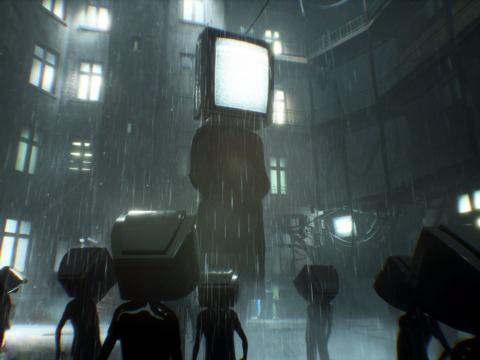
Finally, I encountered a pretty serious bug during my playthrough. In-game, you have a menu that lets you track objectives and manage your “health” when necessary. Without looking at this menu, it’s often impossible to know what the game wants from you next, as it’s the only indication of new objectives. At one point, I lost the ability to open this menu whatsoever, meaning I couldn’t see where to go next or even heal myself any longer. This bug lasted for a decent length of time before eventually fixing itself and staying fixed for the remainder of the game. During that time, however, I was at a loss for what to do, almost to the point of needing a guide. Luckily, I was able to remember a detail and found the right place to trigger a new event, which fixed the issue. This bug is apparently quite common, with lots of people complaining about it online. Even worse is that the only way to fix it, unless it fixes itself, is to restart the game from the beginning, as it only keeps one save. If you’re interested in playing this game, be warned that you may encounter this irritating bug as I did.
Observer is one of those games that feels like it should have been so much more. While the developer absolutely nailed the tone and atmosphere of a cyberpunk world, this game has several rough edges that drag down the overall experience. The horror feels shoehorned in, a holdover from Layers of Fear. It’s annoyingly confusing to find the way forward at times. The main story is disjointed and bogged down by a lackluster performance from the main character. And, while it may not affect everyone, the menu bug is quite frustrating and almost gamebreaking. Even with all these problems, however, I still recommend the game for lovers of cyberpunk, as I believe the world-building and setting worth exploring. I don’t necessarily want a sequel to Observer, but I’d love more exploration of its world, maybe in a different format that isn’t hampered by the constraints of its gameplay systems. With a bit of refinement, I think it could be one of those iconic cyberpunk worlds.
